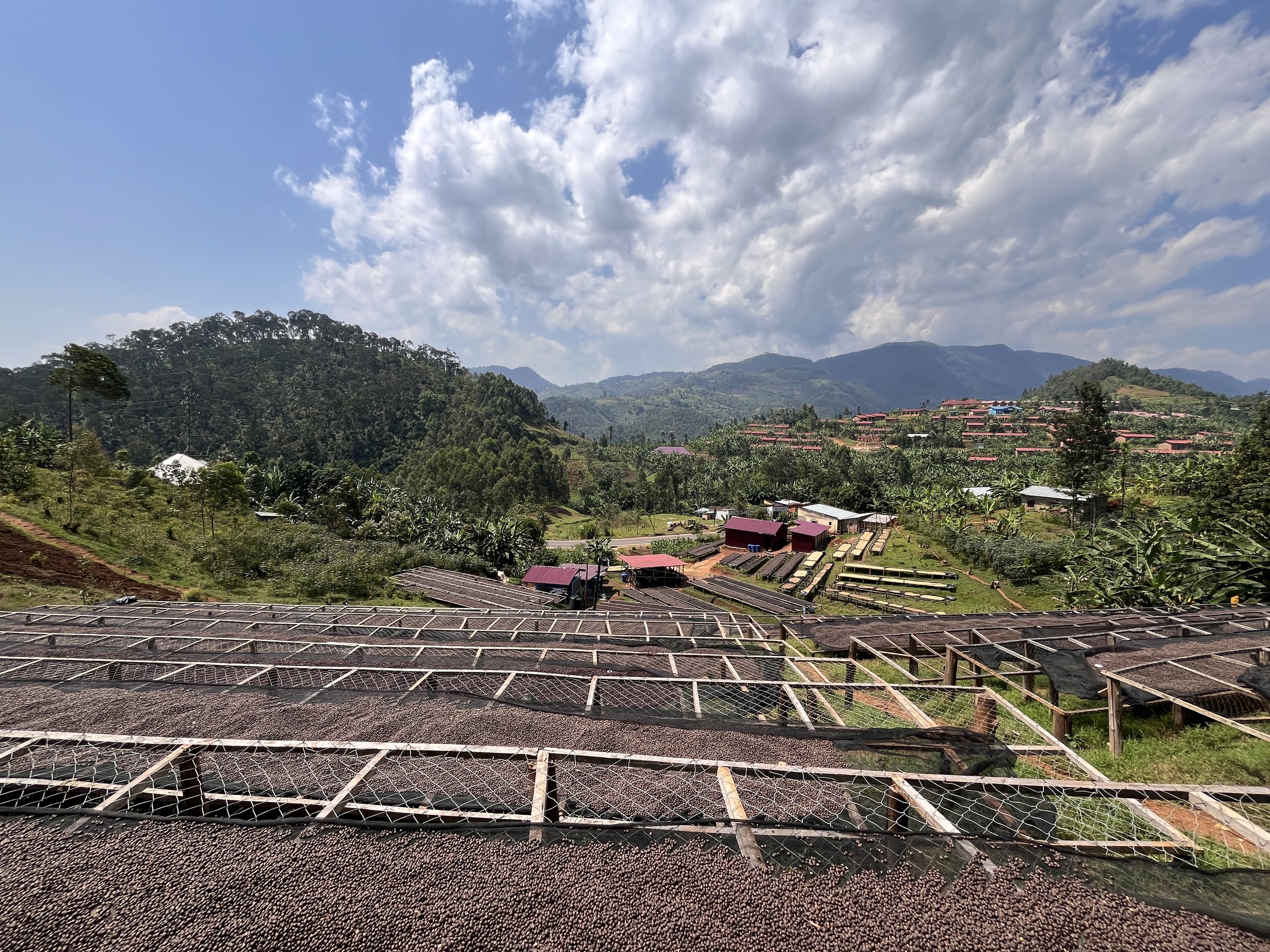 Image 1 of 3
Image 1 of 3

 Image 2 of 3
Image 2 of 3

 Image 3 of 3
Image 3 of 3




Akagera 100Hr Anaerobic Natural, Rwanda
While we are no strangers to the phenomal coffees from Sundog/Baho this is our first time buying from the Akagera Station.
Baho Coffee began managing the Akagera Station in 2020, located in Rwanda’s renowned Nyamasheke District, between Lake Kivu and Nyungwe National Forest. As Baho’s second smallest station, it serves 515 farmers and produces about 35,000 kg of green coffee annually. Akagera is closely connected to the nearby Ngoma Station, with many farmers delivering to both.
Previously managed by the Kobakanya Cooperative, the station faced challenges with market access and operations by the end of 2019. Recognizing the station's potential, Baho Coffee, led by Emmanuel, took over management while maintaining a partnership with the cooperative. Kobakanya continues to support its growers, now benefiting from stable prices and access to the specialty market through Baho.
Under Baho’s management, farmers receive extensive support: free inputs like fertilizer and seedlings, help with transportation, tool lending, and contributions toward health insurance. Each station includes a dedicated agronomist who conducts training on plant care, traceability, and environmental stewardship—ensuring both high-quality coffee and improved farmer livelihoods.
As honey and natural coffee processing become more common in Rwanda, producer Emmanuel has been exploring innovative whole cherry fermentation techniques to stand out in the specialty coffee market. Since 2019, small volumes of these experimental coffees have been exported annually, and there's a growing collaboration to refine and replicate his unique methods. The process begins with careful sorting of ripe cherries under shade, followed by density sorting via flotation. The highest-quality cherries are fermented in sealed plastic tanks for 100 hours in low-oxygen (anaerobic) conditions, which enhance fruit intensity and sweetness.Post-fermentation, cherries are dried slowly on raised beds for 34 days using a "low and slow" method—initially under mesh netting, then under full sun once moisture drops below 20%. This extended drying period, inspired by slow cooking techniques, is believed to enhance the coffee’s flavor complexity and shelf life.
While we are no strangers to the phenomal coffees from Sundog/Baho this is our first time buying from the Akagera Station.
Baho Coffee began managing the Akagera Station in 2020, located in Rwanda’s renowned Nyamasheke District, between Lake Kivu and Nyungwe National Forest. As Baho’s second smallest station, it serves 515 farmers and produces about 35,000 kg of green coffee annually. Akagera is closely connected to the nearby Ngoma Station, with many farmers delivering to both.
Previously managed by the Kobakanya Cooperative, the station faced challenges with market access and operations by the end of 2019. Recognizing the station's potential, Baho Coffee, led by Emmanuel, took over management while maintaining a partnership with the cooperative. Kobakanya continues to support its growers, now benefiting from stable prices and access to the specialty market through Baho.
Under Baho’s management, farmers receive extensive support: free inputs like fertilizer and seedlings, help with transportation, tool lending, and contributions toward health insurance. Each station includes a dedicated agronomist who conducts training on plant care, traceability, and environmental stewardship—ensuring both high-quality coffee and improved farmer livelihoods.
As honey and natural coffee processing become more common in Rwanda, producer Emmanuel has been exploring innovative whole cherry fermentation techniques to stand out in the specialty coffee market. Since 2019, small volumes of these experimental coffees have been exported annually, and there's a growing collaboration to refine and replicate his unique methods. The process begins with careful sorting of ripe cherries under shade, followed by density sorting via flotation. The highest-quality cherries are fermented in sealed plastic tanks for 100 hours in low-oxygen (anaerobic) conditions, which enhance fruit intensity and sweetness.Post-fermentation, cherries are dried slowly on raised beds for 34 days using a "low and slow" method—initially under mesh netting, then under full sun once moisture drops below 20%. This extended drying period, inspired by slow cooking techniques, is believed to enhance the coffee’s flavor complexity and shelf life.
While we are no strangers to the phenomal coffees from Sundog/Baho this is our first time buying from the Akagera Station.
Baho Coffee began managing the Akagera Station in 2020, located in Rwanda’s renowned Nyamasheke District, between Lake Kivu and Nyungwe National Forest. As Baho’s second smallest station, it serves 515 farmers and produces about 35,000 kg of green coffee annually. Akagera is closely connected to the nearby Ngoma Station, with many farmers delivering to both.
Previously managed by the Kobakanya Cooperative, the station faced challenges with market access and operations by the end of 2019. Recognizing the station's potential, Baho Coffee, led by Emmanuel, took over management while maintaining a partnership with the cooperative. Kobakanya continues to support its growers, now benefiting from stable prices and access to the specialty market through Baho.
Under Baho’s management, farmers receive extensive support: free inputs like fertilizer and seedlings, help with transportation, tool lending, and contributions toward health insurance. Each station includes a dedicated agronomist who conducts training on plant care, traceability, and environmental stewardship—ensuring both high-quality coffee and improved farmer livelihoods.
As honey and natural coffee processing become more common in Rwanda, producer Emmanuel has been exploring innovative whole cherry fermentation techniques to stand out in the specialty coffee market. Since 2019, small volumes of these experimental coffees have been exported annually, and there's a growing collaboration to refine and replicate his unique methods. The process begins with careful sorting of ripe cherries under shade, followed by density sorting via flotation. The highest-quality cherries are fermented in sealed plastic tanks for 100 hours in low-oxygen (anaerobic) conditions, which enhance fruit intensity and sweetness.Post-fermentation, cherries are dried slowly on raised beds for 34 days using a "low and slow" method—initially under mesh netting, then under full sun once moisture drops below 20%. This extended drying period, inspired by slow cooking techniques, is believed to enhance the coffee’s flavor complexity and shelf life.